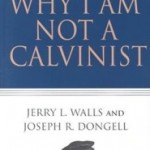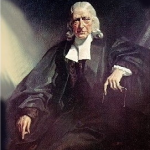Wesleyan Perspectives on Faith
 I attended a men’s Bible study a month or so ago, and the text being read was James 2:14-26. It is an interesting passage. Here we read things like this:
I attended a men’s Bible study a month or so ago, and the text being read was James 2:14-26. It is an interesting passage. Here we read things like this:
- “What good is it, my brothers and sisters, if you say you have faith but do not have works? Can faith save you?” [Implied answer: no.]
- “So faith by itself, if it has no works, is dead.”
- “Show me your faith apart from your works, and I by my works will show you my faith.”
- “Was not our ancestor Abraham justified by works when he offered his son Isaac on the altar?”
- “You see that a person is justified by works and not by faith alone.”
- “For just as the body without the spirit is dead, so faith without works is also dead.”
And I was reminded again of the vital relationship between faith and works in the teachings of the Bible. Genuine faith must eventuate in good works — in obedience to God and service to others. While I am never in a position to judge the genuineness of another person’s faith — nonetheless, faith must always make a difference.
And, this is one of the reasons I am thankful for the Wesleyan holiness tradition where my early faith was nurtured. Here are some themes that I especially appreciate in the Wesleyan perspective on faith:
1. Faith and Obedience are Vitally Related to One Another.
Particularly in the Wesleyan tradition (not to say that other Christian traditions may not also affirm this) the vital connection between faith and works (or faith and obedience) has always been emphasized.
On Monday, December 9 I posted this brief quote on the Steele’s Answers blog:
The fact that genuine faith always includes obedience is a sufficient answer to the skeptic’s objection that salvation is made to hinge upon a bare intellectual act, without reference to the character of the agent. It is just the opposite. It is an act of submission to the highest authority in the universe — an act which tends to conserve its moral order, by enthroning the moral law in universal supremacy. A singular confirmation of the truth of these remarks is found in the Greek Testament, where ἀπείθεια, unbelief, is frequently used to signify disobedience and obstinacy. The unbelief for which men are to be everlastingly condemned lies in the rebellious attitude of the will toward Jesus Christ, and not in any supposed innocent intellectual inability to believe the truth of God’s word.
This is one of the things I most appreciate about the Wesleyan approach to faith: the insistence that faith makes a difference. It changes lives. Faith does not just make a difference in our standing with God: faith, if it is genuine has moral consequences.
2. Repentance is a Necessary Preparation for Saving Faith.
But, then, early Wesleyan writers and teachers also insisted on the necessity of repentance as a preparation for saving faith. Turning from all known sin was taught to be the necessary first step toward saving faith.
 In his sermon “The Lord Our Righteousness” John Wesley says:
In his sermon “The Lord Our Righteousness” John Wesley says:
…we must repent, before we can believe the gospel. We must be cut off from dependence upon ourselves, before we can truly depend upon Christ. We must cast away all confidence in our own righteousness, or we cannot have a true confidence in his. Till we are delivered from trusting in anything that we do, we cannot thoroughly trust in what he has done and suffered. First, we receive the sentence of death in ourselves: Then, we trust in Him that lived and died for us.
At its heart, this repentance is a change in direction. It is the modern equivalent of the Old Testament prophets’ call to “turn” (שׁוּב). So, we read in Isaiah 55:7: “…let the wicked forsake their way, and the unrighteous their thoughts; let them return (שׁוּב) to the LORD, that he may have mercy on them, and to our God, for he will abundantly pardon.”
Can the emphasis on a changed life be maintained without this emphasis on repentance? I don’t think it can. In this, I think, the fundamentalists — influenced by the teachings of Dispensationalism — have won out. For a long time the call to faith, even in the most conservative and evangelical ministries — and, I might say, especially in them — has not been preceded by any call to repentance. You will look in vain for it in the Four Spiritual Laws and in many other methods that have been used to share the faith in our day.
Let me suggest that this is one area where new thought and reflection needs to happen. How can we effectively renew the call to repentance in our day? What terminology needs to be used? Notice how Wesley speaks of it. It is a casting away of all confidence in our own righteousness. It may be repentance of sin — recognized, no doubt, very specifically. But, it may also be a repentance from our own proud religiosity. (That’s what it was for Wesley himself, as it also was for Martin Luther, and many others in the history of the church.) At its heart repentance is a radical turn from dependence on ourselves. This is the preparation for a life lived in dependance on the grace of God.
3. Saving Faith is accompanied by Assurance.
Those who were saved by faith know that they are. They are not in a doubtful relation to God. They have the witness of the Spirit to their relationship with God.
 Several months ago I re-edited Bishop Mallalleiu’s book, and I was struck by the following quote:
Several months ago I re-edited Bishop Mallalleiu’s book, and I was struck by the following quote:
Now, Methodism has constantly and strenuously declared that, in this experience, this threefold experience of pardon, justification, and regeneration, the one having the experience must be cognizant of the fact; and just at this point Methodism has differed with many most excellent Christian people who have claimed that it has not been within the scope of human knowledge to cognize either the fact of pardon, justification or regeneration; but the doubts and fears and uncertainty of these good people have not deterred Methodists from declaring that they know that they have passed from death unto life.
The early Methodists would have thought it both strange and dangerous for pastors and spiritual counselors to encourage a faith that had no accompanying witness. If we are living by faith we know we are. If we have a relationship with God it is natural for our spirits to cry out “Abba, Father” to God (see Romans 8:15, Galatians 4:6).
 This is closely tied to the previous point: the insistence on repentance. Again, hear Wesley’s perspective:
This is closely tied to the previous point: the insistence on repentance. Again, hear Wesley’s perspective:
And that no man can be justified and not know it, appears farther from the nature of the thing: For faith after repentance is ease after pain, rest after toil, light after darkness. It appears also from the immediate, as well as distant, fruits thereof.
— Minutes of Some Late Conversations between the Rev. Mr. Wesleys and Others. Conversation 1. Monday, June 25th, 1744.
Hope in God arises from a previous sense of despair in oneself and one’s own efforts. Turning away from all else, we find assurance in the knowledge of God’s love and forgiveness.
Let me refer again to Mallalleiu’s extended treatment of this theme:
4. Thus, Saving Faith is not merely Intellectual but Personal.
Only beware thou do not deceive thy own soul with regard to the nature of this faith. It is not, as some have fondly conceived, a bare assent to the truth of the Bible, of the articles of our creed, or of all that is contained in the Old and New Testament. The devils believe this, as well as I or thou! And yet they are devils still. But it is, over and above this, a sure trust in the mercy of God, through Christ Jesus. It is a confidence in a pardoning God. It is a divine evidence or conviction that ‘God was in Christ, reconciling the world to himself, not imputing to them their’ former ‘trespasses;’ and, in particular, that the Son of God hath loved me, and given himself for me; and that I, even I, am now reconciled to God by the blood of the cross.
— Sermon #7 “The Way of the Kingdom”
This kind of faith influences the whole of a person’s life. It cannot fail to do so.
I am thankful to those who first set me on this Christian road, for pointing me to that kind of faith.
May such witness continue in our day.













There is a teacher named Andrew Wommack, for whom I have a great deal of respect, who teaches much the same as this article. He emphasises in his messages the importance of finding a balance between Grace and Faith to avoid becoming dogmatic and dry or too emotional and lacking substance.
The simplistic truth that as Christians we need to exercise our Faith to see it grow seems to be missed by so many people in recent years, with a single focus on either Grace or Faith as “the” way rather than a portion of it. It’s both a relief to me to find an affirmation from a seperate source of the importance of both, and also a source of concern that this concept that should be at the “Spiritual Milk” level of our Faith has been at best overlooked, and at worst disregarded by such a large portion of earnest believers.
It’s a theme that needs to be recognised and taught much more prominently in general, as it is the cornerstone to effectively reaching those who have rejected Christianity, or rather their perception of it, as irrelevant or something just for the future and after this life.
I had the privilege of sharing with a lady last week how relevant Jesus is to me on a daily basis in my everyday life, and some of the ways I experience Him in every aspect of my existence. She was completely astounded that it was something so present-tense in my life, and not something I considered as a “get out of Hell free” card to be used some time in the future.
Such a shame that message is not more prominent while we get distracted by minutia looking at specific sins or groups instead of the important work and message of the Gospel itself!
I tend to get rather focused on the Bible and the early Methodists. I don’t always see how this teaching overlaps with other traditions or with the teachings of various current preachers. But, I am interested in this. I’m sure there are many themes that i see as “distinctively Wesleyan” which are simply the common property of the Church through the Scriptures and our common experience of living the faith. I can fall into a kind of tunnel vision just because I have a particular set of interests and a particular focus. And, I find these days that I am far more interested in areas of agreement than in areas of disagreement.
I think there’s some amazing truth in the work of Wesley and the other founders of the Methodist movement. It revolutionised the Christian world at the time and changed the face of the Faith as it was known at the time.
My background was raised an Anglican, my dad’s parents were both Salvation Army, I’ve moved through Baptist and New Frontiers and independant local churches. They all held one thing in common, namely the four points you mention above. In each case, the solid foundations Wesley held so dear, and which are so very present in the Methodist tradition as a result, are held as the key to seeking Holiness in the relationship we all seek with God.
Like you, I try to focus on areas of agreement rather than conflict these days. We live in a time where the church has been so badly fragmented and divided by in-fighting and squabbling that the central message of the Gospel gets diluted or buried completely. There will always be factions that seek to promote their own agenda, some of which need to be seriously considered and some of which need to be halted. But we need to be sure we stop being a house divided and present Jesus in a loving way to the fallen world, irrespective of their starting point.
Craig, thanks for the site – I have been enjoying reading your articles.
“The early Methodists would have thought it both strange and dangerous for pastors and spiritual counselors to encourage a faith that had no accompanying witness. If we are living by faith we know we are. If we have a relationship with God it is natural for our spirits to cry out “Abba, Father” to God (see Romans 8:15, Galatians 4:6).”
What would you say to someone who does not think they have this witness?
I have been a Christian for nearly 10 years though personal assurance seems to be something that evades me. I know that Wesley and others would say I should to doubt my salvation because I have no inner sense of the Spirit telling me “You’re a child of God”.
The thing is, what am I to do if that is true? – I have repented as best as I can. I know the scriptures fairly well and am under no delusions about the demands Christ makes for discipleship and am willing to submit with his help. However, I continue to live an anxious, defeated joyless Christian life.
This kind of teaching about the witness and assurance kind of leaves me at a loss.
I think your experience is fairly common. But, I would encourage you to seek more. Don’t doubt God’s acceptance or love. Don’t make “assurance” a “work” (so to speak) that you have to (somehow) perform in order to be saved. It is a privileged more than a requirement. The question is: why is assurance withheld? Is this because of some residual guilt that you are bearing? Is this because you doubt the reality and depth of God’s love for you? I don’t know. But, the Scriptures do promise you the privilege of assurance of son-ship.
Some people have found this assurance at the Walk to Emmaus, because of its heavy emphasis on the love of God. Some people have come into it gradually as they have let go of their feelings of guilt. Some just continue to hold on by naked faith.
Assurance of salvation does seem to be normative from a Biblical and traditional perspective.
(I’m sorry I was so slow in replying to your comment, Mark.)
Craig
Many thanks for your thoughtful reply.
You said; “Is this because you doubt the reality and depth of God’s love for you?”
I would say yes, this is often the issue. It is a circular thing, though. The reasoning would be “I don’t have the witness of the Spirit, therefore I doubt God’s love”.
Do you see what I mean?
Yes. I do. I think it is important to see the Witness of the Spirit as a privilege rather than a requirement. Otherwise you get stuck in the vicious cycle you mention.
Hi Craig and Mark
I hope you don’t mind a third party’s question in this thread!
After 30 years as a Christian I have heard many teachings as to what qualifies a “work” as proof of the indwelling of the Holy Spirit. In the past I have seen healing through the laying on of hands, both from a receiving and praying perspective, met two people who were raised from the dead and three people who as part of their testimony have prayed successfully for this same miracle, and more financial miracles as answers to prayer than I can remember.
I don’t believe in coincidence, maybe one or two events like these could be passed off as such, but in the number I’ve experienced I find it hard to believe the mathematical odds of so many prayers answered in extreme circumstances where it was quite literally life-or-death situations being in favour of the answer coming.
I recognise the Power of the Holy Spirit in these events, but my reading around – both what little Wesleyan sermons as well as contemporary authors like Bruce Wilkinson – suggests that these kinds of miracles should be a part of our lives as Christians as a witness to the outside world of the Power of God still at work today.
Craig, I became a Christian at 13 after my brother was killed in an accident and the church I was a part of didn’t believe in miracles. I didn’t know any better so I accepted it, but I was told “God needed another angel” by a spiritual counsellor trying to help me get through the grief of Robin’s death. It made me very angry at God for a very long time but somehow never drove me away from the Church – I simply moved and joined a different one.
It seems to me when I read scripture, both Old and New Testament, that God used the miracles from the jar of oil that didn’t run out to raising Lazarus to the Resurrection itself as a call to those people who needed His Love and guidance. Often the miracles came before the direct message as a way to capture people’s attention from my understanding.
I don’t have the formal training you have, and my Greek and Hebrew is non-existent as I can’t even get the alphabets let alone the subtlties of the language itself, but the Jesus I see in the Gospels seemed to be a man with an extraordinary connection with man’s humanity, a sense of humour, not the stern condemnatory speech I was taught in my early life. The account of Him taking about the dogs being allowed to eat the crumbs under the children’s table always troubled me as out of context until I thought about the whole conversation and how apparent accusation was met with such gentleness in the end.
Jesus’s Witness before His rising from the dead was all about compassion to both Jew and Gentile. He imitated His Father and a part of that included miracles. The First century church clearly accepted miracles as a part of everyday life, indeed it only seemed to become less a part of that early experience after Christianity was established as the official religion of the Roman Empire.
I describe myself as a “Regressive” Christian when people ask – and they do – because I long to see miracles as a part of my witness. The closets I have regularly is that as a diabetic my symptoms of this progressive illness have not advanced in nearly 15 years, my eyesight remains unaffected and I show no sign of kidney damage despite poor control for much of that time. My doctors don’t understand how it’s possible and all I can tell them is that I pray as well as take my medication.
Where do you gentlemen stand on the idea of miracles today as a part of our inheritance in Christ?
I am seeking answers to grow as a Christian, looking back for Spiritual Milk as I feel it has been lacking in my diet recently.
Thanks for this Blog, Craig. You’ve helped my tremendously in the past to grasp perspectives I’d not considered and I value and respect your opinion on this matter
Blessings & Warm Regards
David Beddow
I am thankful that God is still in the miracle working business. Nonetheless I am reluctant to develop too much of a Theology of Miracles since such things are sovereign acts of God and “signs” (to use the language of John’s gospel) of the Reign of God on earth. Few things are so repulsive to me than the way certain evangelists are using the promise of miracles as a money making scheme for themselves! You might want to seek out the work of Dr. Craig Keener on this topic — since he has studied both ancient & modern miracles in the Christian tradition.
I agree that there are too many charlatans out there who use big promises to persuade people to “buy” a miracle with a donation to their particular ministry. It’s repugnant to me, and I’m sure God will judge the hearts of those involved simply to line their own pockets.
I agree genuine miracles are certainly the power of the Holy Spirit and as part of the Godhead therefore are sovereign works in that sense, pointing to Christ must be the objective. I’ll look out for Dr Keener’s work on the subject, thanks for the tip.
It’s a pity you don’t have a donate button! I’d without a doubt donate to this outstanding blog! I suppose for now i’ll settle for book-marking and adding your RSS feed to my Google account. I look forward to brand new updates and will share this website with my Facebook group. Talk soon!